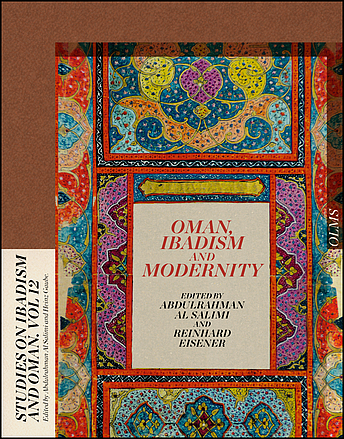Al Salimi | Eisener
Oman, Ibadism and Modernity
ISBN 978-3-487-15549-4
englischModernity, strictly speaking, is a most ambiguous term, all the more as concepts of modernity for decades were, and still are, widely discussed in academia and beyond, in particular since the breakdown of communism. The more recently felt appearences of so-called ‘Islamic fundamentalism’ and ‘Islamic terrorism’ added further fuel to these debates, also in the public asking once again and a bit shortsighted the question about the compatibility of Islam with modernity. The purpose of the present book primarily is not to add to theory debates, rather than providing insights into the more practical question of how the impact and challenges of a more and more rapidly changing world were and are met—a world perceived, whether positively or negatively, as modern in the colloquial sense of ‘new’, ‘up-to-date’, and associated with progress affecting the own way of life, scale of values, and sociopolitical organisation. Following this pragmatic approach in the case of Ibadism and Oman, their specific features concerning two periods of intensified discourse about renewal are dealt with here. On the one hand, the emergence of Muslim modernism in the second half of the 19th century as a response to the calamities of colonialism, when a number of Muslim intellectuals saw in (a revitalized) Islam the potential to overcome backwardness and meet at eye level with the superior European powers. And on the other hand, the contemporary endeavours to preserve and shape one’s own meaningful and effective societal or state identity, not only within the current world order, still widely perceived as being unilaterally dominated by Western powers, their values and technological achievements, but also as an active participant in its present and future organization.
englischModernity, strictly speaking, is a most ambiguous term, all the more as concepts of modernity for decades were, and still are, widely discussed in academia and beyond, in particular since the breakdown of communism. The more recently felt appearences of so-called ‘Islamic fundamentalism’ and ‘Islamic terrorism’ added further fuel to these debates, also in the public asking once again and a bit shortsighted the question about the compatibility of Islam with modernity. The purpose of the present book primarily is not to add to theory debates, rather than providing insights into the more practical question of how the impact and challenges of a more and more rapidly changing world were and are met—a world perceived, whether positively or negatively, as modern in the colloquial sense of ‘new’, ‘up-to-date’, and associated with progress affecting the own way of life, scale of values, and sociopolitical organisation. Following this pragmatic approach in the case of Ibadism and Oman, their specific features concerning two periods of intensified discourse about renewal are dealt with here. On the one hand, the emergence of Muslim modernism in the second half of the 19th century as a response to the calamities of colonialism, when a number of Muslim intellectuals saw in (a revitalized) Islam the potential to overcome backwardness and meet at eye level with the superior European powers. And on the other hand, the contemporary endeavours to preserve and shape one’s own meaningful and effective societal or state identity, not only within the current world order, still widely perceived as being unilaterally dominated by Western powers, their values and technological achievements, but also as an active participant in its present and future organization.


